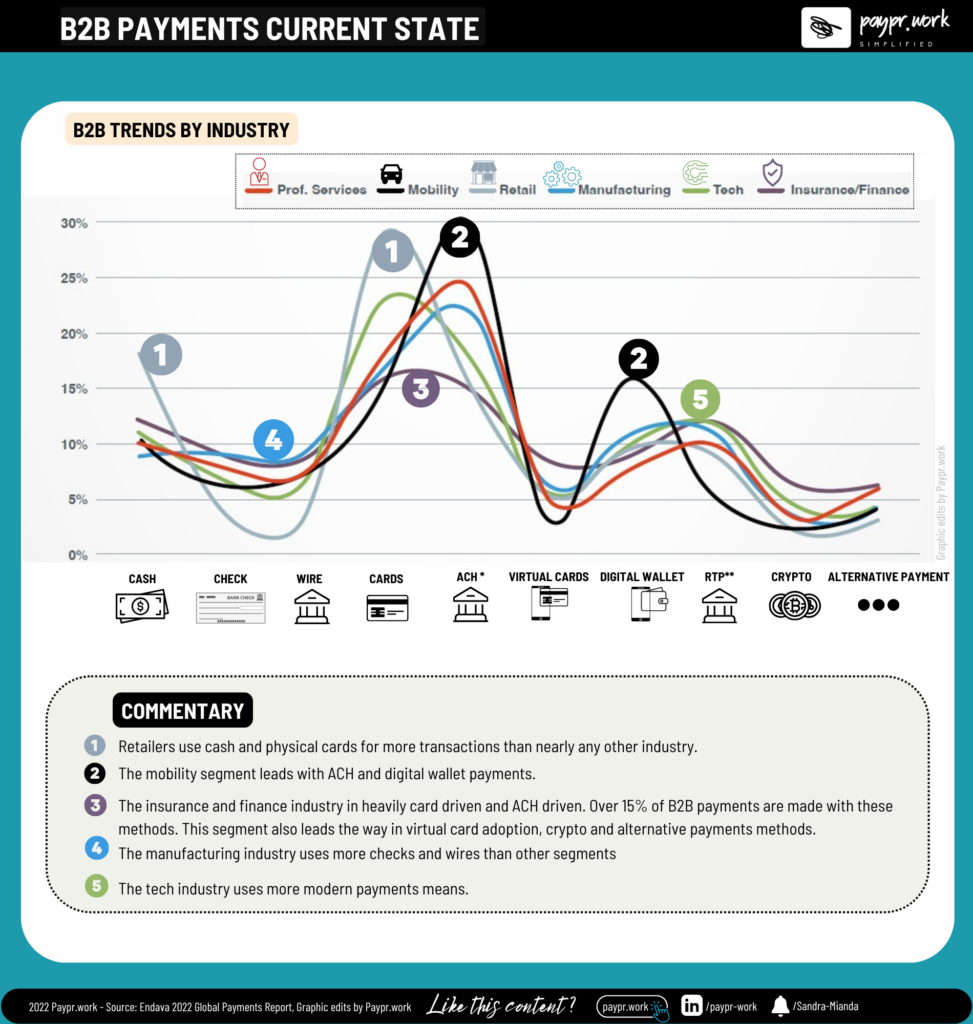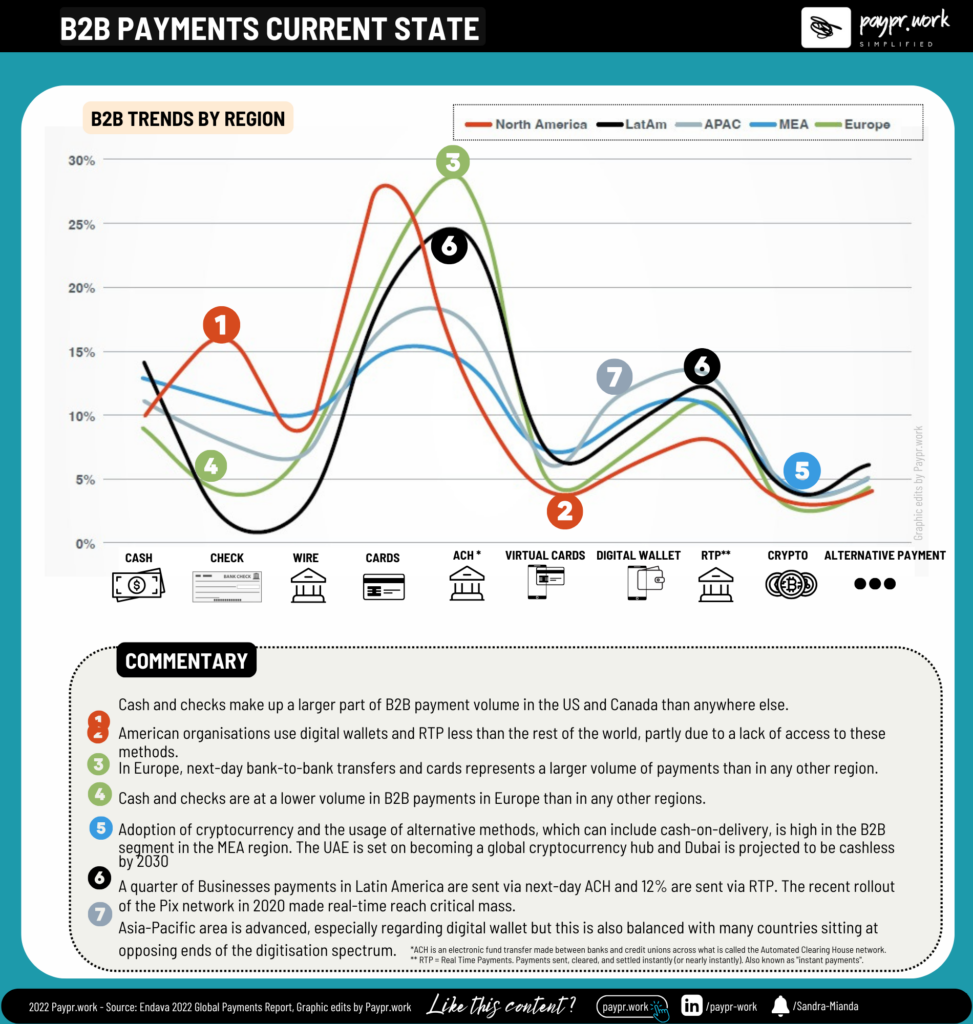
The B2B payments segment is one that has long relied on manual processes and legacy technology. Today, however that ecosystem is advancing at good pace, using more modern tools and methods⚙️.
Endava recently released their Global payments report, which gives a good update on today’s trends in business-to-business (B2B) payments on a worldwide scale🌍. The report covers:
➡️The challenges of operating manual processes;
➡️The benefits of digitisation;
➡️And what payments could look like in the future in the B2B segment.


Some of the highlights:
⚙️Whilst there is a great disparity in digital adoption across B2B payments, with some countries still heavily reliant on cash and others operating nearly cashless, checks and cash are however no longer the dominant methods they once were (i.e. roughly 20% of global payment volume combined).
⚙️Countries where cash and checks remain dominant maintain paper-based processes because of supplier demand and convenience.
⚙️Locations where electronic payments are the norm, they have achieved digitisation by combining government leadership and private sector fintech innovation.
At regional level:
🔍 North America still uses a high volume of checks to pay suppliers (16%).
🔍 In Europe, next-day bank-to-bank transfers and cards represents a larger volume of payments than in any other region.
🔍 Cash and checks are also at a lower volume in Europe than in any other region.
🔍 Cash transactions in MEA are high, as is the usage of alternative methods, which can include cash-on-delivery.
🔍 Adoption of cryptocurrency is also higher in the B2B segment in the MEA region than in other regions.
🔍 Close to 25% of B2B payments in Latam are sent via next-day ACH and 12% are sent via RTP.
🔍 The B2B payments trends in Asia-Pacific are varied. Overall, the area is advanced, especially regarding digital wallet but this is also balanced with many countries sitting at opposing ends of the digitisation spectrum. Small- and medium-sized businesses rely more on cash and checks than larger companies.
At Industry level:
💡 The insurance industry in Europe is trailing others in making electronic payments. Insurers sent more paper-based payments with checks and cash and less using RTP and ACH than the average European business.
💡Retailers use cash and physical cards for more transactions than nearly any other industry.
💡 The tech industry uses more modern payments means.
More details covered in Endava report.
—–
🚀 🅵🅾🅻🅻🅾🆆 Paypr.work [ˈpeɪpəwəːk] for simplified payments content, supported with ⬇️:
☑️ Insightful analysis
☑️ Contributions from fellow payments experts
☑️ Bespoke infographics
☑️ Tailored training programmes
Paypr.work blends payment knowledge and custom research into a simplified yet insightful narration. Our narratives feature visually engaging designs that break down both fundamental and complex payment jargons into bite-sized, repetitive micro-concepts to promote better comprehension and retention.
Sign up for a Paypr.work Premium Membership to exclusively access all of our payment resources, including our full articles, industry insights, ecosystem maps, reports, videos, and our unique library of bespoke infographics.
Don’t miss out— sign up to learn payments in a captivating way!



You have provided so much light and knowledge in a fascinating world. You definitely bring the fun to Fintech like no one else and actually know what you are talking about! Thanks goodness for you😁!

Vice President Global Product Expansion, Shift4
Impressive, congratulations Sandra and Team Paypr.work. The detail in each of your 100+ infographics is outstanding and showcases your expertise well… Continued success for this remarkable work!

LinkedIn Strategist | Digital Transformation Leader

Host of Heads Talk
Your diagrams have the ability to explain the most complicated of topics in way that can be understood by anyone. Not many people have the ability to create self-explanatory visuals, so keep doing your magic 🔥🔥🔥!

CEO & Co Founder of CLOWD9
Your content is so informative, accurate, and fabulously presented in infographics that always attract great attention. Your visuals naturally spark strong engagement regardless of the LinkedIn algorithms !

B2B Marketing, Marqeta
The depth of Paypr.work knowledge and skill sets are truly impressive. Their ability to combine deep industry expertise with well-depicted visual is pretty unique. I strongly recommend Sandra and Paypr.work !

Director EMEA Payment Solutions, Marriott International
👏👏 👏👏 👏👏 I always love your content and in fact, I am so happy for all of us in the industry… we’re lucky to have you sharing your payment wisdom with us 🤓… thank you! Keep up the great work.

Strategic Accounts Director, Truelayer | Payments and Fintech Geek
Merci Sandra pour ta facilité à vulgariser le paiement via de simples dessins, qui me surprendront toujours. Pour ceux qui ne connaissent pas son travail, je vous invite à suivre Paypr.work [ˈpeɪpəwəːk]!

Product Manager Paiement, Maisons du Monde
Your enthusiasm and ability to simplify Payments is so refreshing and literally shines through! Sandra and her team research, write content and create some stunning infographics for the payments industry….

Chief Operations Officer, Clowd9
Keep up the good work and know that your hard work and dedication is so inspiring for all of us. You are truly doing an incredible job and your consistent efforts don’t go unnoticed.

Chief Community Officer, NORBr | Redefining Payment Infrastructure | Linkedin Top Voice
Your posts are a masterclass in how payments have evolved from a basic utility to a strategic asset. Your ability to simplify this complexity and provide strategic direction along with implementation support is so invaluable. The clarity and depth you provide are exactly what this fast-evolving industry needs.

Chief Commercial and Operations Officer, Soffid
The mechanics of all things payment are a black box for most industry stakeholders. With the help of their well researched and designed infographics, Sandra and her team at Papr.work demystify complex flows and create awareness about the factors that play a role in the end to end processes.

Paul van Alfen | Managing Director Managing, Up in the Air - Travel Payment Consultancy
Your Paypr.work subscription gets you full access to all Paypr.work content in 1 place including: our weekly new payments articles, our infographic blog, exclusive discounts on all the services that Paypr.work has to offer and the opportunity to collaborate on free infographic to promote your knowledge/value proposition and more. The content is for personal use and cannot be copied, reproduced, redistributed, altered, modified, shared publicly or with third-party nor can derivatives of the work be created. The user may share content that is available through the free blog access subject to crediting Paypr.work with the attributions.